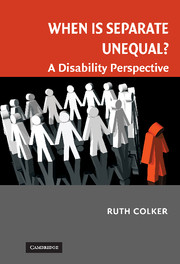Book contents
- Frontmatter
- Contents
- Preface
- Acknowledgments
- 1 Introduction
- 2 Anti-Subordination Above All: A Disability Perspective
- 3 The Mythic 43 Million Americans with Disabilities at the Workplace
- 4 K–12 Education
- 5 Higher Education and Testing Accommodations
- 6 Voting
- 7 Reflections on Race: The Limits of Formal Equality
- Index
1 - Introduction
Published online by Cambridge University Press: 05 June 2012
- Frontmatter
- Contents
- Preface
- Acknowledgments
- 1 Introduction
- 2 Anti-Subordination Above All: A Disability Perspective
- 3 The Mythic 43 Million Americans with Disabilities at the Workplace
- 4 K–12 Education
- 5 Higher Education and Testing Accommodations
- 6 Voting
- 7 Reflections on Race: The Limits of Formal Equality
- Index
Summary
As catharine mackinnon has observed, “it is common to say that something is good in theory but not in practice. I always want to say, then it is not such a good theory, is it?” This book aspires to build a disability theory that works in practice.
On the basis of my review of the empirical literature, my reading of the relevant statutes and case law, and my experience as a parent raising a child with a disability, I believe that we should measure equality from an anti-subordination perspective. We should adopt practices based on our conviction that they will help individuals with disabilities overcome a history of subordination in our society. Empirical analysis can be an important tool in helping us determine what types of practices are most likely to attain substantive equality. Although integration can be an important tool in our attempts to attain substantive equality, we should not assume that integration is presumptively more effective than tools that have some separate or segregating elements.
I offer those opening remarks with the knowledge that some people will immediately misunderstand me. They will accuse me of being against integration. They will accuse me of not sufficiently valuing individuals with disabilities, and the contributions they offer to society.
But nothing could be further from the truth. I fully embrace integration when we have reason to believe that it is an effective tool to attaining meaningful, substantive equality.
- Type
- Chapter
- Information
- When is Separate Unequal?A Disability Perspective, pp. 1 - 9Publisher: Cambridge University PressPrint publication year: 2008



